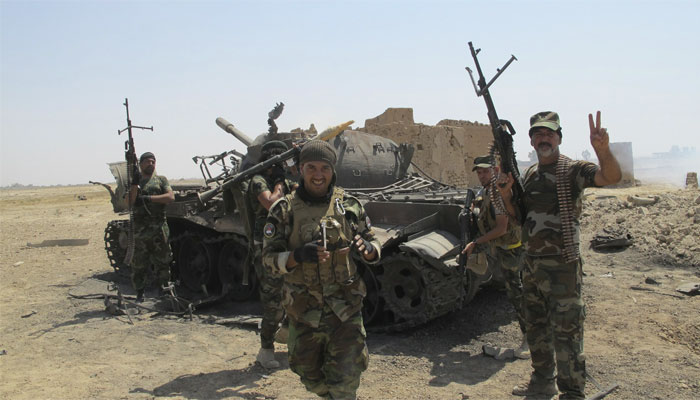Iraqi Shia militia fighters celebrate, near the wreckage of a tank belonging to Islamic State militants, after breaking a long siege of Amerli by Islamic State militants Reuters
AFP
Iraqi forces made more progress Tuesday in their fightback against jihadists but in Baghdad anger boiled over as hundreds stormed parliament over the fate of missing soldiers who surrendered in June.
After breaking a months-long jihadist siege by Islamic State fighters of the Shia Turkmen town of Amerli, troops on Tuesday regained control of part of a key highway linking Baghdad to the north.
Two towns north of Amerli were also taken from the jihadists on Monday as Iraqi forces -- backed by US air strikes -- score their first major victories since the army's collapse across much of the north in June.
That collapse left some 1,700 soldiers in jihadist hands, with many believed to have been executed.
Demanding to know their fates, angry relatives stormed the parliament building in Baghdad, attacked MPs and began a sit-in in its main chamber, an official said.
Anti-riot police were trying to force out the hundreds of protesters, who were also calling for some officers to be held accountable, said the official, who was present at parliament.
Concern over those in jihadist hands has been fuelled by reports of widespread atrocities, including accusations from Amnesty International of war crimes and ethnic cleansing.
The Sunni extremist IS declared an Islamic "caliphate" in regions under its control in Iraq and Syria after it swept through much of the Sunni Arab heartland north of Baghdad in June and then stormed minority Christian and Yazidi Kurdish areas.
IS has carried out beheadings, crucifixions and public stonings and Amnesty International on Tuesday accused the jihadists of "war crimes, including mass summary killings and abductions" in areas under its control.
"The massacres and abductions being carried out by the Islamic State provide harrowing new evidence that a wave of ethnic cleansing against minorities is sweeping across northern Iraq," said its senior crisis response adviser Donatella Rovera.
The UN Human Rights Council unanimously agreed to send an emergency mission to Iraq to investigate IS atrocities, after a senior UN official said the jihadist group had carried out "acts of inhumanity on an unimaginable scale."
Concern over the scale of the humanitarian crisis helped prompt Washington to begin carrying out limited air strikes in support of Iraqi forces, Shia militia and Kurdish troops battling the jihadists.

